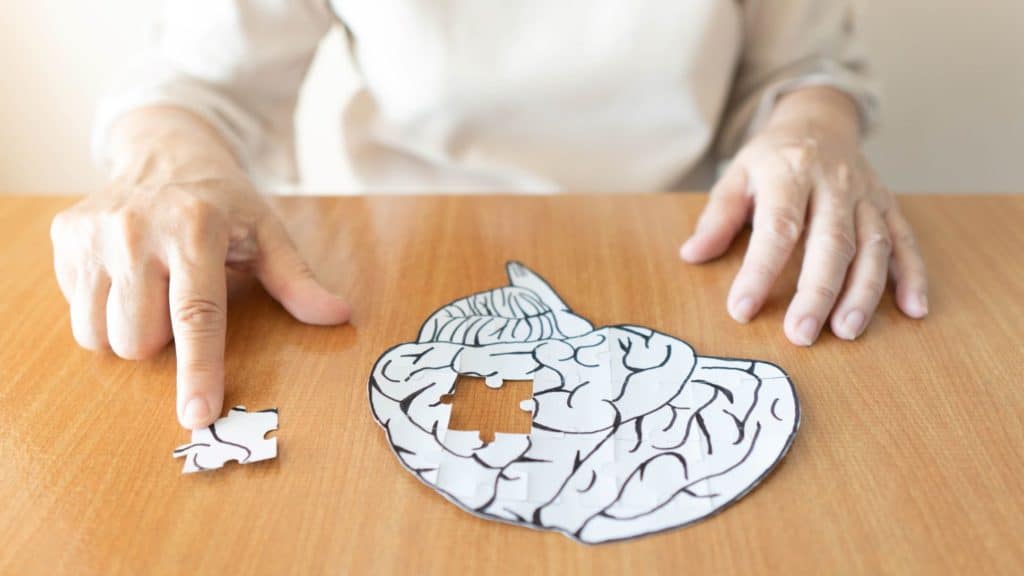Schizophrenia and Substance Abuse
A lot of stress can be experienced when a mental disease first starts. For those with a schizophrenia diagnosis, in particular, there are several difficulties. They have a higher risk of turning to drugs and alcohol as a coping mechanism if they don’t have access to sufficient mental health care or knowledge about the illness. Drug and alcohol abuse can also cause psychotic relapses, bring on the earlier onset of symptoms, or worsen existing symptoms.
At Sana Lake Recovery Center in Dittmer, Missouri, we provide dual diagnosis treatment and therapy services for people suffering from schizophrenia and substance abuse.
What Is Schizophrenia?
 Schizophrenia is a mental disorder characterized by delusional thinking, hallucinations, a warped perspective of reality, poor cognitive function, and disordered speech or behavior. This condition affects about 1% of people in the United States.
Schizophrenia is a mental disorder characterized by delusional thinking, hallucinations, a warped perspective of reality, poor cognitive function, and disordered speech or behavior. This condition affects about 1% of people in the United States.
It’s defined by mental health specialists as a group of severe neurological diseases that change a person’s sense of reality. Individuals who suffer from this disorder may also experience a combination of hallucinations, delusions, and disorderly thinking and behavior that can hinder day-to-day activities and can be extremely disabling.
Schizophrenia can be very frightening for the individual and their loved ones because it disrupts their cognitive functions, behaviors, and ability to communicate, leaving them impaired in relationships, social situations, and on the job.
Psychotic disorders can lead to substance abuse, and addiction can lead to mental illness. Symptoms of drug abuse can also mimic signs of schizophrenia.
Like other psychiatric diseases, schizophrenia has a variety of underlying causes, including genetics, family history, environmental variables, and alterations in brain chemistry. Many people with schizophrenia are stigmatized and misunderstood to have aggressive tendencies and split personalities.
Sometimes people struggling with this mental health disorder are mistakenly diagnosed as having substance use disorders. Battling a psychotic disorder, such as schizophrenia, and a substance abuse problem at the same time is known as a dual diagnosis.
If left untreated or misdiagnosed, symptoms of co-occurring disorders can exacerbate and cause major health complications. At the Sana Lake Recovery Center in Missouri, our healthcare professionals can help manage your condition.
When Does Schizophrenia Develop?
According to the National Alliance on Mental Illness, schizophrenia affects 0.3% of the population. It affects both men and women at roughly the same rate. However, men typically encounter the disorder at a younger age. According to the National Institutes of Health, 1.1% of American adults will receive a diagnosis of schizophrenia at some point in their lives.
Schizophrenia can occur at any age, but it typically affects men in their late teens or early twenties and women in their late twenties or early thirties. It is extremely rare to develop schizophrenia before the age of 12 or after the age of 40.
Schizophrenia Symptoms
 A person with an early onset of schizophrenia can start to show signs after puberty. The majority of people are diagnosed with this mental health condition in their late teens to early 30s. The social impact of this disorder is severe because of the first signs of this disease and the tumultuous symptoms that can occur as a result.
A person with an early onset of schizophrenia can start to show signs after puberty. The majority of people are diagnosed with this mental health condition in their late teens to early 30s. The social impact of this disorder is severe because of the first signs of this disease and the tumultuous symptoms that can occur as a result.
Someone with this type of mental illness has delusional beliefs about being persecuted, threatened, or controlled by others or inhuman forces. People with this particular schizophrenia often obsess over odd conspiracy theories, fear being hunted, and claim to hear voices that order them to do harmful things to themselves or others. They can become isolated, irritable, and fearful of others.
Schizophrenic symptoms are categorized according to how they affect ones sensory experience, thoughts, learning, or social interaction and communication. They include:
- Sensory Symptoms: Visual or auditory hallucinations
- Cognitive Symptoms: False beliefs about grand achievements or persecution.
- Behavioral Symptoms: Self-isolation and social withdrawal; lack of personal hygiene; fear of eating or drinking; physical interaction with others; disorganized speech; no motivation; no interest in working or previous activities; not able to relate to others in socially acceptable ways; wild and unpredictable behavior; lack of impulse control
- Emotional Symptoms: Loss of emotional affect; flat facial expression; emotional responses that don’t make sense; no ability to empathize with others; severe mood changes
Psychotic Symptoms
A psychotic episode is characterized by 3 main symptoms: hallucinations, delusions, and confused and disordered thoughts. As previously mentioned, alcohol or drug addiction symptoms can imitate or be similar to the signs of schizophrenia. These include:
- Social Withdrawal
- Unpredictable mood swings
- Delusional beliefs about oneself and others
- Auditory or visual hallucinations
- Disorganized thinking (scattered thoughts)
- Quick, pressured, and disorganized speech
- Inappropriate emotional effects or responses
- Poor choices and risky behavior
- Lack of concentration
Some of the early signs of schizophrenia can include:
- Bizarre changes in speech or handwriting
- Sudden loss of interest in favorite activities or friendships
- Lack of personal hygiene and grooming
- Focusing on negative or destructive thoughts
- Isolation
- Loss of the ability to control impulses
- Not being aware of one’s environment (surrounding world)
- A flat facial expression
- Failure to finish projects or meet commitments
- Inability to focus on one topic for an extended period
Schizophrenia can affect all aspects of an individual’s mind and personality. Psychosis, experiences that contradict the reality that is experienced by others, is a primary warning sign.
There are several different types of schizophrenia depending on the person’s symptoms. One of the most common forms of this condition that people are most familiar with is paranoid schizophrenia. It’s the most commonly diagnosed subtype of schizophrenia in the United States and typically manifests itself during a person’s teenage or young adulthood years. The other four types are catatonic, schizoaffective, residual, and disorganized schizophrenia.
Schizophrenia and Substance Use Disorders: What to Know
Knowing that a substance use disorder (SUD) is a mental condition is crucial. Drugs alter the function and even the wiring of your brain. This is why, despite their unfavorable and frequently grave effects, some people crave and seek out particular narcotics. On the substance use disorder spectrum, addiction is at the severe extreme. Having schizophrenia puts you at an increased risk of using drugs and alcohol in unhealthy ways. Here’s what you need to know about these mental disorders and their treatment options.
Substance Use Disorders Are Mental Illnesses, Too
The combination is frequently referred to as a co-occurring disorder when it is combined with schizophrenia or another mental illness. A substance use disorder will eventually be present in about half of individuals with a mental condition, including schizophrenia.
What’s the Connection Between Schizophrenia and Substance Abuse?
There may be an overlap in the brain circuits involved with both conditions. Over time, drug use alters the brain structure of some regions that schizophrenia disturbs. Additionally, there is a notion that suggests schizophrenia-related issues with the brain’s reward system may be a factor in why people with schizophrenia have a higher incidence of SUDs. For instance, strange brain wiring might make nicotine and possibly other substances more pleasurable.
The majority of researchers don’t believe that drug abuse causes schizophrenia, but if you do have a mental health condition, then you are more likely to develop a substance or alcohol addiction than the general population. Developing schizophrenia or having pre-existing mental health issues can result in drug abuse.
Common Substance Use Disorders That Co-Occur With Schizophrenia
Alcohol, nicotine, cocaine, and cannabis are often abused substances by people with schizophrenia. The prevalence of substance addiction among patients with schizophrenia has been reported in studies to range from 10% to 70%.
According to research, over half of all patients with schizophrenia have abused at least one substance before developing the mental disease. A diagnosis of a substance use problem is also 4.6 times more common in people with schizophrenia than in the general population. Here is more information regarding schizophrenia and the most common substance use disorders that co-occur.
There is a strong link between alcohol use disorder and schizophrenia. Compared to illicit drugs, alcohol can be simpler for people with schizophrenia to become dependent on since it is so widely accessible. About one-third of those who have schizophrenia will eventually develop an alcohol consumption issue. This shows that the self-medication theory is not always true because alcohol abuse frequently occurs before the onset of schizophrenia.
Research has also discovered a link between marijuana and symptoms of schizophrenia. Cannabis usage has been linked to a possible worsening or acceleration of the onset of psychotic symptoms in certain populations. In one study, it was discovered that 53% of individuals who had their first episode also met the criteria for cannabis use disorder. Drugs like marijuana and stimulants such as amphetamines or cocaine can worsen the symptoms of schizophrenia when battling a co-occurring disorder.
Smoking is also linked to schizophrenia. One of the most common forms of substance abuse in people with schizophrenia is nicotine abuse. Studies have shown that sufferers are three times more likely to get addicted than the general population. The relationship between this mental health condition and smoking is complicated and not fully understood, leading researchers to explore whether or not their need for nicotine is biological.
Smoking comes with multiple health hazards on its own, but can also cause antipsychotic drugs to be less effective. It can also be more challenging to quit smoking if you also have schizophrenia. The effects of nicotine withdrawal can heighten psychotic symptoms, and careful strategies such as nicotine replacement methods may be easier.
Patients with schizophrenia who have cocaine use disorder have a higher risk of suicidal ideation, poor treatment adherence, and hospitalization. Additionally, they are more likely to have experienced trauma early in life and come from low-income neighborhoods. Cocaine use is a common coping mechanism for dysphoric and adverse schizophrenia symptoms.
Risk Factors of Schizophrenia and Substance Use
Some of the typical risk factors for mental illness can include:
Schizophrenia may develop as a result of a history of mental health issues, as well as, substance abuse. According to the diathesis-stress concept, developing schizophrenia is common when genetic predispositions toward the disorder are combined with extreme drug use. Remember that addiction alone does not cause schizophrenia.
Furthermore, there is compelling evidence that genetics in combination with childhood trauma might exacerbate schizophrenia symptoms. These investigations might be challenging since troubling memories can be obscured by other thoughts. It can be challenging to establish a timeline as well.
Substance abuse by those who have mental illnesses is common. According to some psychiatric specialists, people with schizophrenia may begin abusing drugs because they believe doing so relieves some of their symptoms, such as impaired social functioning. A few examples of this include finding it difficult to handle interpersonal relationships, excel at a job, or resolve societal issues. Self-medicating is the term for this concept.
Dual Diagnosis Treatment
 People with co-occurring disorders such as schizophrenia and addiction make it difficult to seek treatment. The symptoms of schizophrenia are severe and make it hard to cope, so sufferers are at risk of using drugs or alcohol to self-medicate and escape the effects of this disorder. Substance abuse can also increase the risk of suicidal thoughts, trauma, and homelessness in individuals with schizophrenia.
People with co-occurring disorders such as schizophrenia and addiction make it difficult to seek treatment. The symptoms of schizophrenia are severe and make it hard to cope, so sufferers are at risk of using drugs or alcohol to self-medicate and escape the effects of this disorder. Substance abuse can also increase the risk of suicidal thoughts, trauma, and homelessness in individuals with schizophrenia.
Being homeless, isolated, and fearful of others can prevent a person from seeking the help that they need. Both conditions should be addressed when going through treatment. Treating one condition and not the other is not effective when it comes to a successful long-term recovery.
In general, mental health practitioners agree that schizophrenia and substance use disorder should be treated concurrently. As part of a comprehensive examination, our mental healthcare professionals will assess the patient for each disorder. Dual diagnosis programs in conjunction with behavioral therapy and some medications have been proven to successfully treat these co-occurring conditions. They include:
Talk therapy known as CBT helps people with schizophrenia and substance use disorders confront their erroneous thinking and aids in teaching behavior modification techniques in the face of challenging circumstances.
DBT helps people with schizophrenia and addiction improve relationships, manage emotions, and reduce harmful behaviors. This type of psychotherapy utilizes mindfulness and acceptance strategies.
Sana Lake Recovery Can Help You Manage Your Mental Health and Addiction
If you or your loved one would like to seek treatment for schizophrenia and addiction, take the first step today by speaking with one of our representatives. You can also read more about our mental health treatment options for co-occurring disorders and learn about our rehabilitation center on our website.



